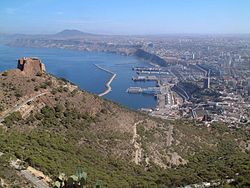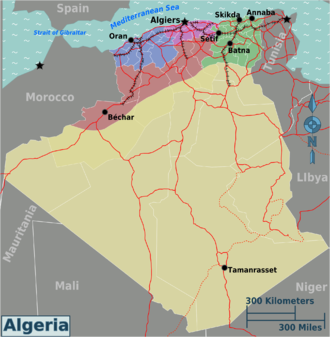
Algerialie inAfricaNorth AfricaofMediterraneanAlong the coast.
learn
geography
The southern part of Algeria is a desert that occupies 80% of the land area, the central part is a wide and gentle plateau, and the Mediterranean coast is a narrow coastal plain; the rivers are mostly Xiehe.
history
In the 5th century BC, two Berber kingdoms were established in northern Algeria. Later Rome, Byzantium, Arabs, Spain, Turkey and France invaded successively. It became a French colony in 1905. On November 1, 1954, the Afghan people launched an armed uprising. On September 19, 1958, the provisional government of Afghanistan was established. Independence was officially declared on July 5, 1962.
people
Electricity
The power standard in Algeria is 220V 50Hz, and uses the CEE 7 plug and socket systemCEE 7/7 plug, CEE-7/16 plugs can also be used, and CEE 7/16 plugs can also be used, but this plug is usually not grounded. If you want to use your own electrical appliances, please bring an adapter.
climate
The terrain is divided into two parts: the northern part is the coastal plain and the Atlas Mountains, and the coastal areas are milder and humid, and belong to the Mediterranean climate; the south is the Sahara Atlas Mountains and the large plateau, which belong to a transitional climate. The southern region is the northwest part of the Sahara Desert, accounting for 4/5 of the country's area. The terrain is inland basins and plateaus, and the climate is dry and hot, and belongs to a tropical desert climate. Algeria's mountainous areas are cold in winter. There are strong African hot winds, especially dust and sand entrained in the summer monsoon. The annual precipitation is below 700 mm.
festival
- New Year (January 1st)
- Sacramental Day-Sunni Sacramental Day is March 12th in the Islamic calendar, Shia is March 17th.
- Labor Day (May 1st)
- Independence Day (July 5)
- Eid al-Fitr, also known as Rozi, is a holiday celebrated by Muslims around the world to celebrate the end of Ramadan, on the first day of the Shawaru month (October 1) in the Islamic calendar.
- Gurbang Festival (translated as Eid al-Adha, Singapore and Malaysia is called Haji Festival), also known as "Big Festival", is an important festival in Islam. On December 10th of each year in the Islamic calendar, after the Hajj. This holiday is to commemorate the prophet Ibrahim (Christian translation of Abraham) faithfully fulfilling God’s command to sacrifice his son Ishmael (Christian translation of Ishmael) to Allah, and then replace this with a lamb. event.
- National Day (November 1)
area

| Central Algeria Metropolitan area around the capital. |
| Northeast Algeria Mountains and plateau areas east of Algiers. |
| Northwest Algeria The mountainous coastal area west of Algiers. |
| Sahara-Atlas The inland mountain range of the plateau. |
| Sahara The vast desert area in the south of the country. |
city
- Algiers -The capital of Algeria
- Tipasa -Famous tourist destination in Algeria
- Wahran
- Constantine
- Annaba
- Blida
Other destinations
arrival
 | Visa restrictions:Due to the sanctions imposed by the League of Arab States, Israeli citizens and any foreigners who blatantly display an Israeli visa and/or entry stamp will be barred from entering the country. |
aviation
railway
Private car
bus
Passenger ship
transportation
Language
go sightseeing
Activity
Shopping
cost
Dining
Nightlife
stay
Learn
Work
Safety
Algeria and Libya, Mali, Mauritania, Niger and Tunisia are at risk of terrorist activities and kidnapping near the border. The governments of some countries have issued "do not travel" warnings to these areas in Algeria. Terrorists are very active in southern Algeria. Don't travel after dusk; if you can, you can travel by plane instead of by car; avoid walking on small roads; if you are not sure about your surroundings, you can ask the police or the gendarmerie. View travel advice on the government websites of Australia, Canada, Ireland, and New Zealand.
Medical treatment
manner

Ramadan Ramadan is the 9th month of the Islamic calendar and the most sacred month, lasting 29 to 30 days. During this time, Muslims will fast during the day and almost all restaurants will not open before dusk. From morning to night, Muslims cannot eat anything (including water, cigarettes). Non-Muslims do not have to comply, but try not to eat in public because it is impolite. The length of work will also be shortened. The exact date of Ramadan depends on local astronomical observations, which may vary from country to country. Ramadan ends atEid Mubarak, This festival may last for several days.
If you plan to visit Algeria during Ramadan, please seeTraveling during Ramadan。 |
Algeria, like the countries in North Africa, the main religion isIslam, So visitors must abide by local laws and Islamic taboos. For example, if you want to visit a mosque, you must wear conservative clothing and do not wear too naked. Alcohol policies vary across the country. Some cities prohibit bars or shops selling alcohol. Remember, you can only drink at home or in a prescribed place; drinking in public is rare.
In addition, in view of the current political conflict, it is not advisable to talk about local politics.
Smoking
Cigarettes are sold freely in Algeria.
However, if you want to smoke in public, you must be allowed by the local people before you can smoke. If someone doesn't like the smell of cigarettes and even causes others to cough, or the locals ask you not to smoke, please put out the cigarettes and say sorry to the locals; it is the same whether it is a foreigner or a local. If you are invited to someone’s house, please don’t smoke. You can only smoke with the owner’s permission.
If you smoke in a restaurant or coffee terrace, this is allowed, but you must first get the consent of the local industry operator. In a global health awareness, there are now fewer and fewer people who smoke. It is not acceptable for women to smoke locally, and it is a shame for women to smoke locally.
Please stand in the other side's perspective and think about it, you will be popular with the locals.

